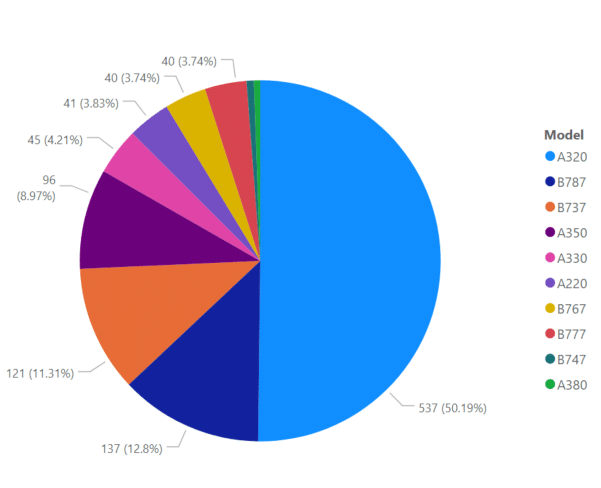Airbus Versus Boeing
As we all know, there are two main plane makers in the world today making the lion’s share of commercial passenger-carrying aircraft. Boeing and Airbus are more or less a duopoly in the skies and have been keenly fighting for market share for a number of years now. They've both had wins and setbacks from which they have managed to recover with lessons learned.
Now that 2019 is behind us, a year that many are quite glad to have in the rearview mirror, it might be interesting to see how it washed up for Boeing and Airbus.
It's not hard to see which aircraft model was the most prolific in 2019. The Airbus A320 family of aircraft has been selling well for Airbus and in a year where the Boeing 737 MAX was not compromised by groundings, that aircraft should have been delivered in the same numbers.
Let's not forget the turnaround in the fate of the Super Jumbo Airbus A380. That aircraft was set to pick up the reins from the Queen of the Skies, the much loved Boeing 747, and take us into the new Millenium in style. What Airbus failed to recognise was the advent of much better engine technology. This technology paved the way for the giant twin-engined jets to service those long overwater routes previously reserved for the four-engined airliners. This was bad news for Airbus as the sales of the A380 fell well short of the break-even point where the aircraft sales had covered the development and manufacturing costs. As if on a signal, different airlines cancelled their A380 orders or at least reduce them. The huge Emirates order will keep manufacturing going for a limited time until all orders of the type dry up.
It is not all bad news for Airbus, however. Where some of the A380 orders were cancelled, they were replaced by orders for the new A350 XWB. Even Emirates converted some of its A380 orders to A350 XWB orders. Obviously a cheaper option for airliners, and one that will continue to be developed into the future.
The smaller A320 family of aircraft has a higher production rate than the other models which is obvious from the graphic. These aircraft are produced in multiple locations to try and keep up with demand. Airbus is also ramping up the A220 production. The A220 was, of course, bought from Bombardier of Canada.
So, mixed results for Airbus. What of Boeing?
Boeing's story is perhaps much more dramatic and has been very much in focus throughout 2019. As we know, the first event that gave a clue that all was not well with Boeing's new 737 MAX happened in October 2018, when Lion Air flight 610 crashed into the sea shortly after takeoff from Jakarta, Indonesia. The investigation started to show there was a problem with the system that prevents the aircraft from going into a stall. The heightened likelihood of a stall was anticipated due to a larger engine on this model needing to be placed further in front of the main wing to allow it to be raised higher to achieve ground clearance.
The Boeing delivery figures for 2019 show clearly the gap left by the delivery of the smallest model, the 737. The MAX deliveries should have been around the 570 aircraft mark, not 121 as shown above. The larger aircraft such as the 787 and 777 have longer production times and so fewer are produced compared to the 737.
Tragically, this assessment was further proven correct when a second 737 MAX, Ethiopian Airlines flight 302, crashed in similar circumstances after departure from Addis Ababa in March 2019. Not even six months after Lion Air. The aviation world immediately responded by grounding the Boeing 737 MAX pending further investigation and rectification of any issues that were found.
Boeing continued to produce the 737 MAX in the hope that the grounding would be lifted and deliveries could commence. As 2019 wore on it started becoming obvious that the MAX was not going to be allowed back in the air anytime soon. The production was slowed from 52 to 42 aircraft per month, and on 14 March 2019, the first cancellation of a MAX order was received. It was from Garuda Indonesia for 49 aircraft. There have been a number of others and as we write in January 2020, Boeing has suspended production. To be honest, I believe they simply don't have the space to park any more aircraft.
There are around 400 aircraft ready to be delivered. If and when the all-clear is given and depending on what remedial work needs to be done on completed airframes to make them airworthy, Boeing will schedule the delivery of those aircraft while firing up the production lines again.
There have obviously been some bad decisions taken down at Boeing. We can only hope that they can learn from their mistakes and turn this into a win for all. Faith needs to be restored with the airlines and of course their customers, the travelling public. There is a common saying used by many, "if it ain't Boeing, I ain't going". They need to make people feel like that again to get back in the saddle.
So Boeing versus Airbus? Clearly, it has been a win for Airbus in 2019. The European planemaker came late to the party, compared to Boeing and its long history, but there is no doubt that they are a worthy adversary in the big airliner market.




